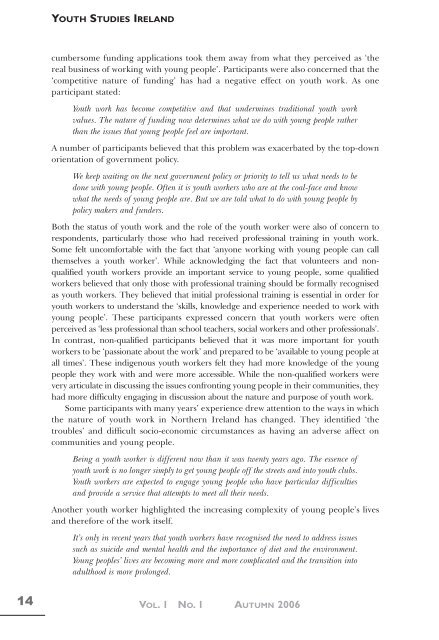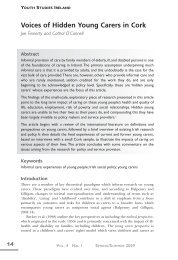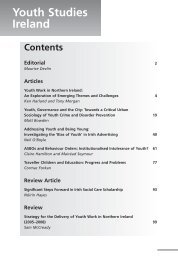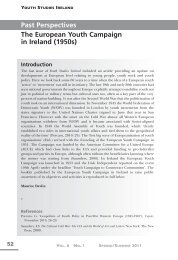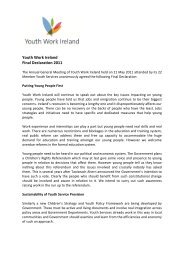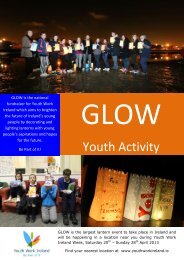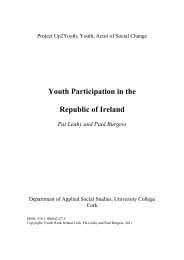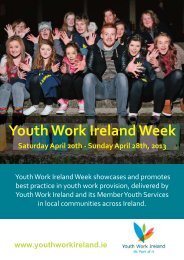Youth Work in Northern Ireland:
Youth Work in Northern Ireland:
Youth Work in Northern Ireland:
You also want an ePaper? Increase the reach of your titles
YUMPU automatically turns print PDFs into web optimized ePapers that Google loves.
YOUTH STUDIES IRELANDcumbersome fund<strong>in</strong>g applications took them away from what they perceived as ‘thereal bus<strong>in</strong>ess of work<strong>in</strong>g with young people’. Participants were also concerned that the‘competitive nature of fund<strong>in</strong>g’ has had a negative effect on youth work. As oneparticipant stated:<strong>Youth</strong> work has become competitive and that underm<strong>in</strong>es traditional youth workvalues. The nature of fund<strong>in</strong>g now determ<strong>in</strong>es what we do with young people ratherthan the issues that young people feel are important.A number of participants believed that this problem was exacerbated by the top-downorientation of government policy.We keep wait<strong>in</strong>g on the next government policy or priority to tell us what needs to bedone with young people. Often it is youth workers who are at the coal-face and knowwhat the needs of young people are. But we are told what to do with young people bypolicy makers and funders.Both the status of youth work and the role of the youth worker were also of concern torespondents, particularly those who had received professional tra<strong>in</strong><strong>in</strong>g <strong>in</strong> youth work.Some felt uncomfortable with the fact that ‘anyone work<strong>in</strong>g with young people can callthemselves a youth worker’. While acknowledg<strong>in</strong>g the fact that volunteers and nonqualifiedyouth workers provide an important service to young people, some qualifiedworkers believed that only those with professional tra<strong>in</strong><strong>in</strong>g should be formally recognisedas youth workers. They believed that <strong>in</strong>itial professional tra<strong>in</strong><strong>in</strong>g is essential <strong>in</strong> order foryouth workers to understand the ‘skills, knowledge and experience needed to work withyoung people’. These participants expressed concern that youth workers were oftenperceived as ‘less professional than school teachers, social workers and other professionals’.In contrast, non-qualified participants believed that it was more important for youthworkers to be ‘passionate about the work’ and prepared to be ‘available to young people atall times’. These <strong>in</strong>digenous youth workers felt they had more knowledge of the youngpeople they work with and were more accessible. While the non-qualified workers werevery articulate <strong>in</strong> discuss<strong>in</strong>g the issues confront<strong>in</strong>g young people <strong>in</strong> their communities, theyhad more difficulty engag<strong>in</strong>g <strong>in</strong> discussion about the nature and purpose of youth work.Some participants with many years’ experience drew attention to the ways <strong>in</strong> whichthe nature of youth work <strong>in</strong> <strong>Northern</strong> <strong>Ireland</strong> has changed. They identified ‘thetroubles’ and difficult socio-economic circumstances as hav<strong>in</strong>g an adverse affect oncommunities and young people.Be<strong>in</strong>g a youth worker is different now than it was twenty years ago. The essence ofyouth work is no longer simply to get young people off the streets and <strong>in</strong>to youth clubs.<strong>Youth</strong> workers are expected to engage young people who have particular difficultiesand provide a service that attempts to meet all their needs.Another youth worker highlighted the <strong>in</strong>creas<strong>in</strong>g complexity of young people’s livesand therefore of the work itself.It’s only <strong>in</strong> recent years that youth workers have recognised the need to address issuessuch as suicide and mental health and the importance of diet and the environment.Young peoples’ lives are becom<strong>in</strong>g more and more complicated and the transition <strong>in</strong>toadulthood is more prolonged.14 VOL. 1 NO. 1 AUTUMN 2006


